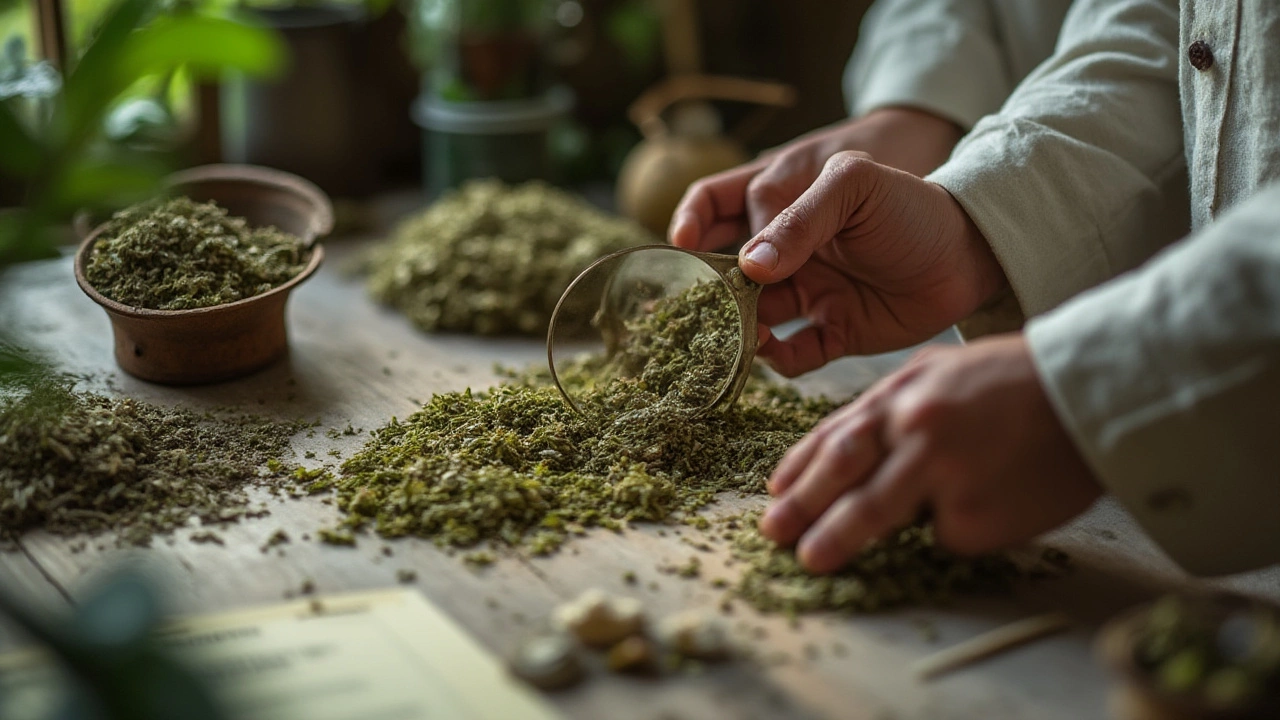Walk down any health store aisle, and you’ll see shelves packed with herbal supplements, all screaming for your attention. Each bottle promises better sleep, sharp memory, glowing skin, stronger immunity, or faster recovery. But here’s the thing—just because a label says “natural” or “herbal” doesn’t guarantee that it’s safe, effective, or even the real deal. Why do some supplements make a real difference, while others are basically just expensive dust? How do you know if that pretty green bottle actually helps you, or could harm you instead? The supplement industry looks like the Wild West sometimes—little regulation, wild claims, and lots of confusion. If you’re thinking of trying herbal supplements, what you don’t know can absolutely hurt you, or at least waste your hard-earned money. Want to buy the right supplement without falling for hype or scams? Let’s get into the reality check every buyer needs.
Reading Between the Lines: The Fine Print on Labels and Ingredients
Start by picking up any herbal supplement—you’ll notice ingredient lists so long and scientific you might think you’re reading a chemistry manual. Companies love dressing things up: fancy plant names, “proprietary blends,” and labels that shout “pure,” “organic,” or “clinically tested.” Here’s the secret—those words mean little unless you know exactly what to look for.
The Food and Drug Administration (FDA) in the US doesn’t approve herbal supplements before they hit the shelves. That means it’s up to you to be the detective. Always check: does the label name the main herb’s botanical and common name? For example, is it “Withania somnifera (Ashwagandha)” or just “Indian ginseng”—which could mean almost anything? If it’s vague, leave it. Watch out for misleading “proprietary blend” claims. Companies do this to hide the exact amount of each ingredient, offering no way to tell if there's enough to matter. If you see that phrase, chances are the active ingredients are sprinkled in tiny, ineffective amounts.
Dose matters just as much as the herb itself. A supplement might list “Turmeric—500mg,” but is that raw powder, a standardized extract, or a mix? Curcumin, the active compound, is what makes turmeric powerful. Look for labels mentioning standardized content like “95% curcuminoids.” Don’t fall for window dressing—“natural” and “organic” don’t make up for missing or unclear dosage info. Bonus tip: the fewer fillers (like magnesium stearate or artificial dyes), the better. Some fillers are harmless, but a laundry list means a diluted product.
Certifications can make a real difference. Check for respected third-party testing seals like U.S. Pharmacopeia (USP), NSF International, or ConsumerLab. These badges mean the supplement was checked for contaminants (think heavy metals, pesticides, or bacteria) and is actually what it says it is. If your bottle claims “lab tested” without a real verification logo, that’s just marketing smoke.
Geographical sourcing tells a big story, too. Herbs grown in heavily polluted regions might soak up toxins from the soil. Ginseng from North America carries a different potency and safety profile than ginseng from China. If the label lists the country or farm or is traceable online, that’s a green flag. Mystery sourcing? That’s a sign to keep shopping.
Expiration date missing or unreadable? Pass. Active compounds in herbal supplements degrade over time—expired pills won’t do much for you, and old stock could even harbor mold. If you buy online, double-check you’re getting a fresh product, not something languishing in a warehouse.
So, when shopping, keep a checklist handy. Look for clear naming, right dosages, proof of testing, detailed sourcing, and expiration dates. Ignore the wild claims, and focus on the substance.

Quality, Safety, and the Wild World of Herbal Supplement Regulation
The wild part about herbal supplements is that you, not the government, are the gatekeeper. In most countries, supplements are classified as food, not drugs. They only get yanked from the market after complaints roll in. The FDA isn’t testing batches before they arrive in stores, so what’s actually inside can be a mystery unless the company submits to third-party verification on their own dime. In 2015, New York’s attorney general tested supplements from four major retailers; four out of five didn’t even contain the primary herb listed on the label. Instead, DNA from rice, wheat, and other fillers popped up. That’s enough to make anyone skeptical about big promises slapped on bottles.
If a supplement is contaminated—maybe with heavy metals like lead or cadmium, or with prescription drugs (yes, this actually happens)—it’s not unheard of to experience serious side effects. A study published in 2023 found that up to 20% of imported herbal products tested were tainted with either heavy metals or unlisted pharmaceutical ingredients. Symptoms can show up as headaches, allergic reactions, liver damage—even kidney failure. Kids, pregnant women, older adults, and anyone with chronic health issues are especially at risk. If you’re buying something for your parents or someone with medical conditions, safety isn’t optional—it’s critical.
Watch for drug-herb interactions, too. St John’s Wort, a popular mood booster, can make birth control pills less effective or interfere with blood thinners. Ginkgo biloba can thin your blood, making it risky if you’re on heart medication. Grapefruit seed extract? That one can actually amplify or reduce the effect of several prescription drugs. Your doctor or pharmacist needs to know what supplements you’re trying, especially if you blend them with other meds.
Don’t ignore allergies. Even if you’re not allergic to the herb itself, added ingredients (like soy, gluten, or lactose) can sneak in and trigger a reaction. Check allergen statements and, if it isn’t clear, move on to a brand that spells it out.
Quality matters more than branding. Well-known doesn’t mean better. Some of the safest companies worldwide still have recalls—the difference is, reputable brands will admit it right away, provide lot numbers, and offer refunds or exchanges. Shady brands vanish overnight or dodge accountability. Before you buy, check online for product recalls or customer complaints.
The price isn’t always a quality marker, but ultra-cheap herbal supplements usually mean cut corners somewhere—in growing, harvesting, formula, or processing. If a supplement costs less than a cup of coffee but claims miraculous results, ask yourself how that’s possible. Ethical companies have to invest in pure sourcing, testing, and quality packaging—all of which cost real money.
Here’s a tough truth—just because an herb works for your friend or got rave reviews from a celebrity doesn’t mean it fits your needs, body chemistry, or existing prescriptions. Trust real science and research over trends. And if clinical studies are cited, look them up for yourself; legit studies will name reputable sources like PubMed or journals you can find online.

Making Smart Choices: Buying Safely, Using Wisely, and Trusting Your Gut
Instant delivery is tempting, but not all online shops are equal. Choose platforms known for vetting their sellers. Amazon does some checks, but third-party sellers still slip through with counterfeit or expired products. Go for “Sold by and shipped by [brand name]” or directly from the manufacturer’s website when possible. Physical stores or trusted pharmacy chains usually keep a tighter grip on inventory quality and storage conditions, which is especially important if you’re eyeing temperature-sensitive herbal extracts like probiotics or certain liquid tinctures.
Read real reviews, not just the five-star gushing or angry one-stars—look for detailed, specific feedback about benefits, side effects, packaging, and customer service. If you see hundreds of vague, similar-sounding reviews posted in a short time window, beware—it’s likely a fake review scam. Some supplement watchdog websites publish independent lab results or consumer experiences. These can sometimes tip you off to problem products before regulators step in.
Once you’ve picked a supplement, start slow. Take less than the recommended dose for a few days, especially if you’ve never used the herb before. Watch for side effects—tummy trouble, headaches, itchiness, changes in mood—and if anything feels off, stop immediately. Everyone’s body reacts differently, and reactions to herbs are way less predictable than to prescription meds. Keep the original packaging in case you need to contact the company or a doctor about a reaction.
Keep your doctor in the loop, even if you think supplements “don’t really count.” Bring a list or even the bottles to checkups. This isn't just about safety—it helps your doc spot possible interactions or overlapping effects that could mess with lab test results or existing meds. Some hospital systems in India, Europe, and the US have started using digital patient charts that flag risky herb-drug combos thanks to so many patients taking herbal supplements with their prescriptions.
If you need ongoing supplements—like ashwagandha for stress support, or milk thistle for liver health—set calendar reminders to track how you feel week by week over a month or two. Jot down any physical changes, positive or negative. This makes it easier to spot what’s genuinely helping and what might be causing trouble you hadn’t linked to a supplement before. If nothing’s changed after three months (assuming you’re taking a verified, quality product), there’s probably no point in continuing to spend money on it.
Store supplements somewhere cool, dry, and out of direct sunlight. The bathroom cabinet—not ideal, thanks to fluctuating humidity that can break down tablets or capsules. And never share supplements with others, even if you bought from a reputable brand. What works for one person’s metabolism or health goals could be totally wrong for someone else.
To sum it up, your best move is to become a mini-expert in the space. Learn what you’re buying, research the brands, question the claims, and keep tabs on how your body responds. Herbal supplements can fill in health gaps and support your wellness journey, but only if you treat them as seriously as you would a prescription drug. With a little detective work, you can avoid the snake oil and find products that genuinely do what they promise.

 How Long Does It Take for a Total Knee Replacement to Stop Hurting?
How Long Does It Take for a Total Knee Replacement to Stop Hurting?
 Can You Avoid Knee Replacement if You Are Bone-on-Bone?
Can You Avoid Knee Replacement if You Are Bone-on-Bone?
 Understanding the Challenges of Curing Pancreatic Cancer
Understanding the Challenges of Curing Pancreatic Cancer
 Unveiling the World's Most Common Illness and Its Impact on Medical Tourism
Unveiling the World's Most Common Illness and Its Impact on Medical Tourism
 Affordable Wegovy Solutions: Discover $25 Monthly Deals through Online Pharmacies
Affordable Wegovy Solutions: Discover $25 Monthly Deals through Online Pharmacies